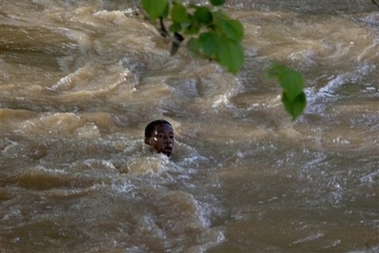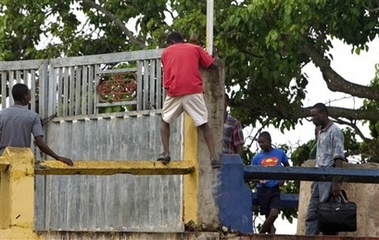| Want to send this page or a link to a
friend? Click on mail at the top of this window. |
| Deport Thy (Darker-Skinned) Neighbour |
|
|
|
|
 |
|
 |
| An Haitian illegal worker swims across the River Massacre
between Haiti and Dominican Republic in Dajabon, some 225 miles northwest of Santo
Domingo, Wednesday, March. 21, 2007. Haitian migrants face systematic discrimination,
violence and deportation without due process from the Dominican Republic, according to a
report released Wednesday by human rights watchdog Amnesty International.(AP Photo/Ramon
Espinosa) |
|
An Haitian workers cross illegally a wall at the border
between Haiti and Dominican Republic in Dajabon, some 225 miles northwest of Santo
Domingo, Wednesday, March. 21, 2007. Haitian migrants face systematic discrimination,
violence and deportation without due process from the Dominican Republic, according to a
report released Wednesday by human rights watchdog Amnesty International.(AP Photo/Ramon
Espinosa) |
SANTO DOMINGO, Mar 21 (IPS) - Discrimination against Haitians living in the Dominican
Republic, whether or not they have their papers in order, is a persistent problem in this
country. Most Haitians live on the fringes of Dominican society.
This country is a long way away from overcoming the problem of segregation of Haitians
and their children, in spite of Haitians being the only people to share the island of
Hispaniola with Dominicans, different observers acknowledge.
"Here, people are discriminated against because they're darker-skinned,"
Jesuit priest Regino Martínez, who ministers in the border town of Dajabón, 300
kilometres northwest of Santo Domingo and 250 kilometres from Port-au-Prince, the capital
of Haiti, told IPS. "People are deported, mistreated and abused simply because
they're Haitian or especially dark-skinned," said Martínez, who is head of the
non-governmental Border Solidarity project, founded in 1997 by the Jesuits with the aim of
promoting and strengthening interrelationships between community organisations on the
northwest border of the country.
Martínez said that "they round up and deport (Haitians) even when their papers
are in order." The main factor determining repatriation, he asserted, is "how
dark their skin is," as Haitians tend to be darker than Dominicans.
The Dominican Republic itself has a high proportion of Afro-descendants. Eleven percent
of Dominicans are black, and 73 percent are mulattoes, the offspring of Spaniards and
Africans.
The depth of the problem was made plain when Dominican President Leonel Fernández said
on Mar. 10 that his administration would not abide by an Inter-American Court of Human
Rights ruling with regard to Dominican children Dilcia Yean and Violeta Bosico, whose
parents are of Haitian descent.
The girls, aged 10 and 12, were refused birth certificates in the Dominican Republic,
where they were born and still live. They were stateless persons until September 2001, and
one of them, Violeta Bosico, was prevented from attending school for one year because of
this, according to the Inter-American Commission on Human Rights, which referred the case
to the Court.
The Court ruled in October 2005 that the Dominican state had violated the girls' rights
to nationality and equality, enshrined in its national laws and established in Articles 20
and 24 of the American Convention on Human Rights.
The ruling ordered that their birth certificates be issued, and that the state publicly
acknowledge its responsibility and apologise to the victims Dilcia Yean and Violeta Bosico
and their parents within six months, in the presence of public authorities, the victims
and their next of kin.
The purpose of the public act, which should be disseminated by the media, is to provide
"a measure of satisfaction and (to) serve as a guarantee of non-repetition," the
Court added. It also ordered the state to pay 22,000 dollars in reparations and expenses
to the victims and their representatives.
Foreign Minister Carlos Morales said last year that the state accepted the judgment and
would act accordingly.
After a few months had passed, and everything indicated that the authorities would
comply with the Inter-American Court resolution, the unexpected statement by President
Fernández, made in Puerto Rico, where hundreds of thousands of Dominicans live, fell like
a bucket of cold water on those hopes and expectations.
The Jesuit Service for Refugees and Migrants (SJRM) said that Fernández's statement
was "deplorable".
However, the on-line news site Clave Digital, citing a government source who requested
anonymity, reported Monday that the Dominican authorities have already paid the
compensation. Wednesday is the International Day for the Elimination of Racial
Discrimination, proclaimed by the United Nations in 1966. The date was chosen because on
Mar. 21, 1960, South African police killed 69 people when they fired on a peaceful
demonstration against apartheid, the white segregationist regime abolished in 1994.
But racism and segregation still persist in many places around the world. "They
are present here, in the Dominican Republic, and the government ought to implement
mechanisms and policies that are in line with international laws," the coordinator of
Mesa para las Migraciones, Eddy Tejada, whose organisation is part of the Regional Network
of Civil Organisations on Migration, told IPS.
"Until we understand that Haitians are our neighbours, there will be conflicts
between us," he said. The two countries share an island with an area of 77,914 square
kilometres, of which over 48,000 square kilometres are Dominican territory. The border
with Haiti is 380 kilometres long.
According to unofficial figures, there are over 800,000 Haitians living in the
Dominican Republic, which has a population of 8.5 million. The population of Haiti is 8.3
million.
A survey of representatives of educational institutions, published in 2005, found that
86 percent of interviewees thought that Dominican society is racist, which is expressed by
insults, verbal abuse, humiliation and injustice in its treatment of especially
dark-skinned people.
In this country, "racism and prejudice towards other groups of human beings is
exacerbated in the case of Haitian nationals, not only because of historical issues but
also for geographical, social and economic reasons," says the report on "Racial
Attitudes in the Dominican Republic", produced by the Latin American Faculty of
Social Sciences (FLACSO) at the request of SJRM.
Haiti is the poorest country in the Americas, and has been afflicted with political
instability and internal violence for decades. Since President Jean-Bertrand Aristide was
overthrown in February 2004, a United Nations multinational peacekeeping force remains
deployed there.
In Tejada's opinion, the Dominican state even foments discrimination through its laws.
The law on migration approved by the senate in August 2004 "was designed to be
anti-Haitian, because its intention is to chase away Haitian immigrants," he said.
Article 49 of the law stipulates that the government's National Migration Council,
created by the same law, shall decide on quotas of temporary workers allowed to enter
Dominican territory, after consultations with the business community, farmers and trade
unions.
Tejada pointed to the discriminatory nature of the paragraph that states that foreign
temporary workers "may not work in free zones or tourism businesses, except in border
areas," and then only if prior agreements are in force.
Mass deportations of Haitians by the Dominican authorities are on the increase. In
2003, 14,700 people were sent back to Haiti; in 2004, 15,464; and in 2005, 20,811,
according to a report on "Haitian Migration and Human Rights," by the Support
Group for Refugees and Repatriated Persons (GARR).
"Repatriations affect all ages and both sexes, without any respect for the number
of years that the person has been living in the Dominican Republic. Most of those deported
are men," the report says.
(END/2007)
Copyright © 2007 IPS-Inter Press Service. Reprinted from IPS-Inter Press Service
of Wednesday, March 21, 2007.
RELATED TEXT: The
Sugar Babies: The plight of Haitian children on the sugar plantation
| Wehaitians.com, the scholarly journal of
democracy and human rights |

